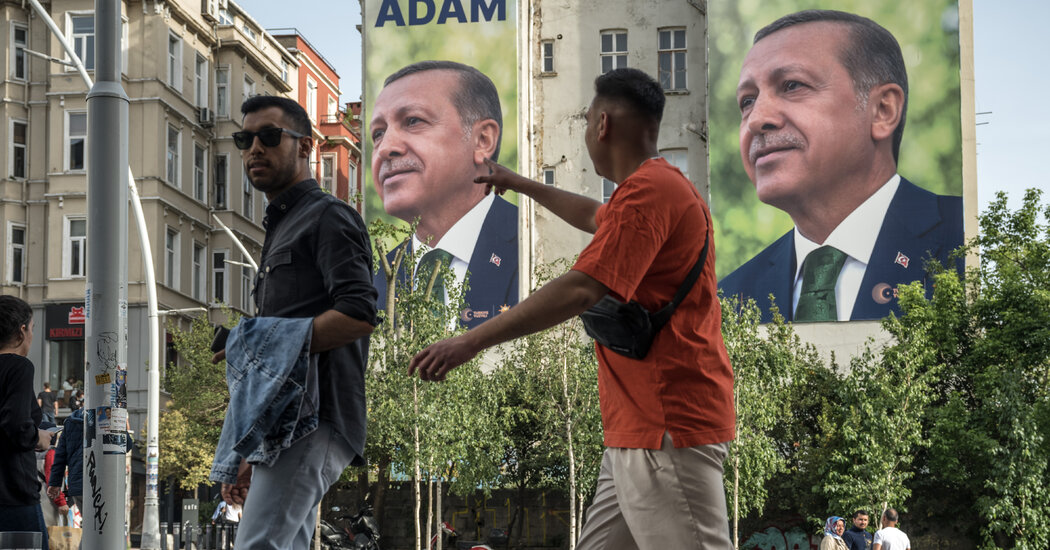Turkey’s election heads to a runoff
President Recep Tayyip Erdogan failed to secure a first-round victory in Turkey’s presidential election and will now face a runoff on May 28. Still, he seems well positioned to win another five-year term.
Preliminary results showed that Erdogan won 49.5 percent of the votes on Sunday, ahead of his main challenger, Kemal Kilicdaroglu, who got 44.9 percent. The right-wing supporters of a third candidate, Sinan Ogan, who was knocked out of the race, are more likely to vote for Erdogan in the runoff, increasing his chances of winning.
Erdogan’s party and its allies also maintained a commanding majority in Parliament during elections for those seats, which were also held on Sunday. That probably further increases Erdogan’s ability to be re-elected.
But the fact that Erdogan could not win a majority — even after he tilted the playing field to his advantage by using state resources for his campaign and relying on sympathetic media — indicates that some voters are frustrated with his financial management and consolidation of power.
Lost ground: Preliminary results showed that, compared with the 2018 presidential election, almost every part of the country shifted against Erdogan. Some of the sharpest rebukes came from the provinces around Turkey’s two largest cities, Istanbul and Ankara.
Analysis: Experts described the results as just the latest example of Erdogan’s formidable survival skills.
Thai opposition agrees to form coalition
Thailand’s two opposition parties said yesterday that they would work together to form a coalition government after they won a clear majority in the general election over the weekend. But it remains unclear if the junta will hand over power easily.
Pita Limjaroenrat, the head of the progressive Move Forward Party, led the effort to build a coalition and could become prime minister. He said he was not concerned about opposition from the military-appointed Senate, which could still block his nomination. “I don’t think the people of Thailand would allow that to happen,” he said.
But if history is any indicator, the military is unlikely to relinquish power quickly. Generals rewrote the Constitution in 2017 to stack the Senate with allies and ensure that the military would determine the next prime minister. Analysts said any effort to block Pita from leading the country would most likely set off protests.
Quotable: “Right now, many people have Pita as their new prime minister in their minds,” an expert said. “If Pita cannot be prime minister, and Move Forward cannot form the government, it will break the people’s hearts. And it will be very, very bad.”
Chinese workers face threats abroad
In March, a group of gunmen stormed a remote mine in the Central African Republic and killed nine Chinese workers there. The attack, and others like it, raise questions about China’s ability to protect its citizens overseas.
The C.A.R. government blamed a rebel group for the attack; the rebels blamed Russia’s Wagner mercenary group, which, in turn, accused the rebels. No side has presented evidence. Only four government soldiers were protecting the site, though more than a dozen were supposed to have been there, a diplomat said. All four survived.
The murkiness has underscored a growing security challenge facing Beijing as Chinese companies expand. Often, they do business in the middle of conflict zones with limited protection. Chinese security frequently relies on a patchwork of local military personnel, mercenaries and private firms to protect Chinese workers.
Quotable: “China is on thin ice in the sense that they’re entering some of the most poorly governed places in the world and supercharging conflicts,” an expert in Chinese development finance said. “And every time an attack happens, it angers the Chinese public and forces China to reconsider this light-touch, hands-off approach.”
THE LATEST NEWS
Asia Pacific
Before he became the mayor of Kathmandu, Balendra Shah was a rap star who pursued a degree in engineering. His electoral success has inspired a wave of young candidates across Nepal to take on a political class perceived as corrupt and incompetent, and dominated by men in their late 60s and 70s who have held office for decades.
ARTS AND IDEAS
A Cannes preview
For cinephiles, there is no holier pilgrimage than the Cannes Film Festival, which begins today.
It is a place where great auteurs have been canonized, like Martin Scorsese, who returns this year with a new feature, “Killers of the Flower Moon,” and Wes Anderson, who will present his ensemble comedy “Asteroid City.” These are the festival’s most anticipated premieres.
Opening the festival is the period drama “Jeanne du Barry,” starring Johnny Depp as King Louis XV of France. But movies aren’t the only thing to watch during Cannes. The film festival will also make red carpet waves.

Tinggalkan Balasan